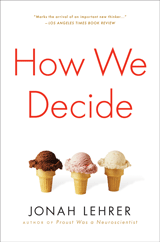I thought it's worth addressing this article one last time. Dr. Ronald Pies (professor of psychiatry at SUNY Upstate Medical University in Syracuse) has written three eloquent and extremely critical blog posts about the article and the analytic-rumination hypothesis. Here's his latest riposte:
Writer Jonah Lehrer caused quite a stir with his recent article in the New York Times Magazine, with the unfortunate title, "Depression's Upside." I have a detailed rejoinder to this misleading article posted on the Psychcentral website. The fault is not entirely Mr. Lehrer's however; his sources included a psychiatrist and a psychologist, who have recently presented a strained and dubious argument claiming that major depression has certain "adaptive" advantages. Lehrer apparently spent little or no time talking to mood disorder specialists who see thousands of severely depressed patients each year.
I'd like to refute that last point. I talked to numerous working psychiatrists - several of which are quoted in the article - and, not surprisingly, got a wide range of reactions to the analytic-rumination hypothesis. Some thought it was interesting and might make sense for people with mild and moderate depression; others, like Peter Kramer, thought it was utter rubbish. (As Kramer says in the article, "It's a ladder with a series of weak rungs.") Dr. Pies implies that every psychiatrist shares his viewpoint, but that's clearly not the case. See, for instance, this recent Louis Menand review for more.
Let's take a seemingly straightforward fact that Dr. Pies has cited in all three of his critiques of the article:
I would not deny that depression, like other challenges in life, may be "instructive" for some proportion of individuals-though probably a minority. I have very serious doubts (as do most of my colleagues) that major depression is "adaptive" in any significant way, though perhaps very brief and mild bouts of depression could confer some modest advantages in an evolutionary sense; eg, by increasing one's empathy toward others, which could be highly adaptive in obvious ways. [cf. "A broken heart prepares man for the service of God, but dejection corrodes service."-- Rabbi Bunam of Pzysha].This could be true, in theory, for more severe depression, but there, the maladaptive aspects of the illness would likely outweigh any modest advantages by a huge margin; eg, the 15% mortality rate in major depression (naturalistic studies), mostly by suicide.
Dr. Pies doesn't cite the specific study, so it's unclear what he's referring to. But it's also worth pointing out that numerous studies have found no relationship between depression and increased mortality. See here, here and here. I'm not trying to dispute the correlation between major depressive disorder and mortality, which I think is pretty clear, especially when it comes to cardiovascular illness. I'm merely trying to show that even a fact as "obvious" as the link between depression and mortality gets complicated and contested very quickly. (Things get even more complicated, of course, when the conversation turns to things like the cognitive deficits of depression.) Here's the summary of a large review on the subject:
There were 57 studies found; 29 (51%) were positive, 13 (23%) negative, and 15 (26%) mixed. Twenty-one studies (37%) ranked among the better studies on the strength of evidence scale used in this study, but there are too few comparable, well-controlled studies to provide a sound estimate of the mortality risk associated with depression. Only six studies controlled for more than one of the four major mediating factors. Suicide accounted for less than 20% of the deaths in psychiatric samples, and less than 1% in medical and community samples. Depression seems to increase the risk of death by cardiovascular disease, especially in men, but depression does not seem to increase the risk of death by cancer. Variability in methods prevents a more rigorous meta-analysis of risk.
Dr. Pies has also argued that it was irresponsible to write about this speculative theory, since it might lead people to neglect treatment. Just to be clear: Neither I, nor Dr. Thomson, ever suggest that people shouldn't seek help for depression. That's just not in the article. Dr. Thomson is critical of what he regards as the "overprescription" of anti-depressants, but that's hardly a novel criticism of modern psychiatry. In fact, one can believe that the analytic-rumination hypothesis is a deeply flawed idea - and there are many good reasons for believing so - and still believe that we're too reliant on medications that aren't better than placebos for treating mild to moderate cases of depression. (Dr. Thomson, for instance, believes that we need more therapy, just better focused on solving real life problems.) But this was not an article about how to treat depression. This was an article about a new theory that attempts to explain why a disorder that feels so goddamn awful is also so common.
As I note repeatedly in the article, this hypothesis remains entirely speculative, with no direct evidence to support it. Given the dismal history of psychiatric speculations - we have no idea, for instance, why SSRI's work, when they do work - the odds are stocked strongly against it. But let's not pretend that modern psychiatry is such a settled science that it can't tolerate a controversial new idea.







Comments (43)
The irresponsibility arises form overestimating the skepticism of the average lay reader. Though you nor Dr. Thomson recommend depressed patients should neglect treatment, when a controversial theory with little scientific backing beyond correlations and behavioral theory is given such high profile status, it's not such a leap to assume that many will see it as an authority. Given the public ignorance over the scientific process, I actually think it is a guarantee this will happen to some degree.
Posted by: Noah Gray | March 5, 2010 5:03 PM